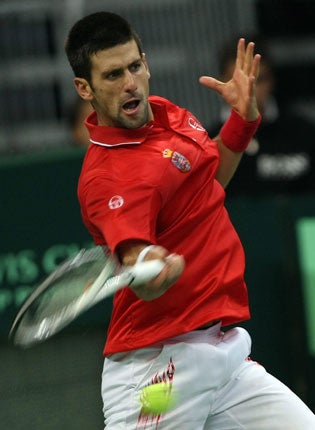Davis Cup matters but stars will still dodge national service

Your support helps us to tell the story
As your White House correspondent, I ask the tough questions and seek the answers that matter.
Your support enables me to be in the room, pressing for transparency and accountability. Without your contributions, we wouldn't have the resources to challenge those in power.
Your donation makes it possible for us to keep doing this important work, keeping you informed every step of the way to the November election

Andrew Feinberg
White House Correspondent
Serbia enjoyed their greatest tennis moment by beating the Czech Republic in the Davis Cup semi-finals last week. And all this despite their lynchpin, world No 2 Novak Djokovic, being forced to withdraw exhausted from the opening singles. He had arrived in Belgrade late on Wednesday following his defeat to Rafael Nadal in the US Open final in New York, which finished in the small hours of Tuesday morning.
By Sunday, Djokovic had recovered to beat Tomas Berdych and level the tie at 2-2. Serbia's hero was Janko Tipsarevic, who beat Radek Stepanek in the decider. Should they beat France in the final, Serbia will become one of the smallest nations to win the Davis Cup. Anyone who doubted what such success can mean to a country should have witnessed the jubilation among the 18,000 spectators, but this historic competition, which has produced many of the greatest tennis moments, is in increasing danger of becoming a sideshow.
The Davis Cup, which started 110 years ago, has been clinging on to its place in the tennis calendar for some years now. With more cities wanting to stage tournaments, one of the greatest challenges for the governing bodies has been to strike a balance between expanding the game and diluting its appeal.
The Association of Tennis Professionals are set to follow the lead of the Women's Tennis Association by bringing forward the end of their season by two weeks, giving players time to recuperate. Adam Helfant, the ATP's executive chairman, says the men's tour is not seeking changes to the Davis Cup's place in the calendar. That might sound like good news but the reality is that a shortened season is likely to test the players' commitment to events outside the 18 which count to their world ranking, even though some points are now awarded for Davis Cup victories. Everyone agrees that the excessive travel and the frequent changes of playing surface are harmful to players' health.
The Davis Cup's dates in the calendar compound the problem. In the space of less than two months this year Djokovic went from playing in Melbourne (outdoor hard courts) to Rotterdam (indoor hard courts) to Dubai (outdoor hard courts) to Belgrade (clay for the Davis Cup) and to Indian Wells (outdoor hard courts).
This year's quarter-finals and semi-finals in the Davis Cup's elite 16-nation World Group were on the weekends after Wimbledon and the US Open. Given that the Grand Slam tournaments are where you would expect the world's best players to be involved at the latter stages, it is no surprise that they have frequently dodged national service.
Even Roger Federer, who played for Switzerland in their post-US Open fixture in the previous five years, pulled out last week, blaming exhaustion; his team lost their place in the World Group, losing to Kazakhstan.
Does the Davis Cup matter any more? Yes it does. The competition adds variety to the tennis year and when players look back on their careers, many will say that their greatest memories are from Grand Slam tournaments or Davis Cups.
The competition is a vital part of the finances for many national federations and takes the sport into otherwise neglected parts of the world: the four Grand Slam countries in particular are fortunate to welcome the world's greatest players to their shores for an extended period every year, but for tennis fans elsewhere the Davis Cup represents a rare chance to see some of those men in action.
There are suggestions that one period of the year should be set aside for the Davis Cup. Other proposed changes include a different format, with new rules to bring a fresh impetus, or using a single venue, though the latter would diminish the competition's "missionary" role.
There is little wrong with the present structure, other than the pressures of an over-crowded calendar. It would not take much to fix but, given the vested interests at play, don't hold your breath.
Subscribe to Independent Premium to bookmark this article
Want to bookmark your favourite articles and stories to read or reference later? Start your Independent Premium subscription today.
Join our commenting forum
Join thought-provoking conversations, follow other Independent readers and see their replies
Comments